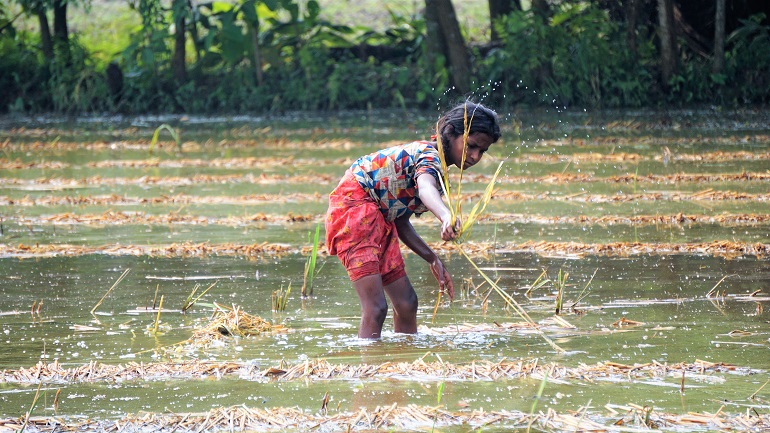Horizon II Pilot Project Aims to Revolutionize Corn, Soybean, Livestock, and Renewable Natural Gas Production
In a significant development for sustainable agriculture, an alliance of 13 public and private entities, led by Roeslein Alternative Energy (RAE), has secured an $80 million grant from the inaugural funding pool of the U.S. Department of Agriculture’s Partnerships for Climate-Smart Commodities program. This substantial grant will be directed toward a five-year pilot project named ‘Horizon II,’ set to unfold in Iowa and Missouri. The Horizon II project is poised to demonstrate a pioneering “Climate-Smart Future for Corn, Soybean, Livestock, and Renewable Natural Gas Production.”
Horizon II, a Landmark for Climate-Smart Agriculture
The Horizon II project represents a groundbreaking initiative aimed at bolstering climate-smart markets, mitigating greenhouse gas emissions, and enhancing carbon sequestration in the production of critical commodities such as corn, soybean, pork, and beef. This endeavor will also generate fresh prospects for small and underserved producers while simultaneously fostering soil health, clean water, flood control, and habitats for native wildlife.
Transforming Renewable Energy Production
The grant award signifies a significant stride towards fulfilling RAE’s core mission, which revolves around establishing a market-based solution that assigns economic value to restored native grasses, prairie plants, and winter-hardy cover crops. This is achieved through the sustainable utilization of harvested biomass to create renewable natural gas (RNG).
Rudi Roeslein, the Founder and CEO of RAE, expressed his enthusiasm about the project, stating, “Since founding RAE, our overarching goal has been to provide farmers an alternative way to use land, especially highly erodible acres, in ways that will benefit the environment, wildlife, and their own livelihood. This funding will propel Horizon II forward more rapidly than otherwise would have been possible. We will show how farmers and landowners can do well for themselves while also providing ecological services and wildlife benefits.”
Pilot Program in Iowa and Missouri
The pilot program will be developed, deployed, and validated in Iowa and Missouri, two states renowned for their significant contributions to the nation’s corn, soybean, and pork production. Horizon II aims to incentivize improved management of nitrogen fertilizer and other inputs on agricultural land, a critical component of climate-smart practices.
Farmers, livestock producers, and landowners will be remunerated for their contributions to reducing greenhouse gas emissions and enhancing carbon sequestration in the soil through an outcomes-based carbon credit program. Furthermore, the production of winter-hardy cover crops and grassland restoration will be further incentivized through a novel, market-based program that supports RNG production via anaerobic digestion of herbaceous biomass combined with manure. This renewable energy can be integrated into the national grid, contributing to a sustainable new value chain.
Collaborative Approach to Low-Carbon Agriculture
The success of Horizon II hinges on collaboration with farmers, livestock producers, landowners, and various stakeholders, including early adopters of sustainable practices and historically underserved producers. This collaborative approach ensures equitable access to the opportunities presented by the low-carbon agriculture of the future.
Horizon II Partner Organizations
The partner organizations participating in the RAE Horizon II project include:
- Conservation Districts of Iowa
- Iowa Agriculture Water Alliance
- Iowa Soybean Association
- Iowa State University
- Missouri Prairie Foundation
- Sievers Family Farms
- Soil and Water Outcomes Fund
- Smithfield Foods
- The Nature Conservancy
- University of Missouri
- Verdesian
- University of California-Davis
- Veterans in Agriculture
Lisa Schulte-Moore, from Iowa State University, emphasized the significance of this investment by the USDA, stating, “Iowa State University has been working with Roeslein Alternative Energy and many additional partners for nearly a decade, laying the foundation for a climate-smart commodity supply chain based on the anaerobic digestion of prairie grasses and winter-hardy crops along with manure.”
A Promising Future for Climate-Smart Agriculture
Once fully developed, deployed, and verified, the Horizon II program holds the potential for expansion and customization to encompass other agricultural commodities and regions across the country. While its primary focus is on reducing greenhouse gas emissions and enhancing soil carbon storage, these climate-smart agricultural systems are expected to deliver additional value in terms of improved soil health, clean water, flood control, and the preservation of native wildlife habitats.


